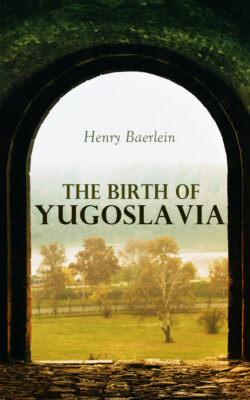Читать книгу The Birth of Yugoslavia - Henry Baerlein - Страница 63
На сайте Литреса книга снята с продажи.
THE METHODS OF SERBIA'S MILOŠ
ОглавлениеOne naturally judges a country of which one is ignorant by the little which one knows about the private life of its ruler. And it was fortunate for Serbia's reputation that Prince Miloš had a Vuk to throw a shadow over him. Kara George had been a hero, Miloš called himself a statesman. Anyhow, he walked in crooked paths, although the murders that he was accused of are now said to be not proven—with the exception of Archbishop Nikčić, one of his critics, and another prominent man whom he requested the Pasha to have strangled. Kara George—one finds in many books—was done away with when he came back to renew the fight against the Turks; most people say that Miloš, his arch-rival, had him murdered in his sleep. All that one knows for certain is that the assassin was a man in the employ of one of Miloš's prefects. As for Miloš sending the head to the Sultan, it is pointed out that as the Sultan's vassal he could not do otherwise. But the stories of his wife, the strong-minded Princess Liubica, are acknowledged to be true—how she would cry out to the warriors, if they seemed to waver, that they were but women, and how this induced them to attack again; how she would cook her husband's meals and wait on him; how when she discovered that any other lady had found favour in the Prince's sight she slew her, and retired into the mountains until her husband was appeased or had discovered a new lady. The court etiquette of that period was under the baneful influence of Turkey. Miloš used to live in Turkish houses—some of them are extant to this day—he gave audience as a Turkish pasha, seated amid cushions on the floor, his room was hung with captured Turkish flags, and on his head he wore a turban. It was often rumoured that when he had gained sufficient money he would not continue to forbid the working of the Serbian salt-mines, lest the profits of his own mines in Roumania should diminish; and it is not creditable that he should have made his subjects pay their contributions to the Turkish Tribute in the currency of Austria, while he would forward it in Turkish currency—of course less valuable—and keep the difference. He also tried to monopolize the swine trade, the most lucrative in the country; he seized whatever he coveted—lands, mills and houses—and even burned down a part of Belgrade in order to build a new Custom-House, whose takings would flow into his pocket. "Am I not the chief," he said, "the Gospodar, and shall I not do what I like with my own?" But he was a real Prince. After the Peace of Adrianople in 1829 an edict was issued by the Sultan, which recognized Serbia as an independent principality, with Miloš as hereditary prince. He organized a standing army and built roads and schools and churches. He abolished, in 1833, the old Turkish system of land-tenure and introduced that peasant proprietorship which causes the Serbs, down to this day, to go into battle in defence of their own lands. In 1836 he offered the bishopric of Šabac to the famous Bulgarian monk, Neophyte Rilski, who wrote the first Bulgarian grammar and translated the New Testament, of which the first edition was burned by the Greek Church at Constantinople, while the second edition sold to the then enormous extent of 30,000 copies. The modest monk, who was born in 1793 and died in 1881, preferred the life of a student and teacher;[39] he therefore declined an offer which was so creditable to him who made it. … Yet in spite of Miloš's great services to his country he had his detractors. It was one of them, perhaps, who painted the portrait that one usually sees of him—an incongruous portrait, because the uniform is most correct—he is holding in his hand the Serbian military headgear, not a turban—but the face, with its serpent-like moustaches, high cheek-bones and black eyes, looks more like that of a Tartar than anything else. Those who did not care for Miloš said that it was barbarism not to let the laws be put in writing; but to this he never would consent. In 1835 he announced in the official Gazette (Novine Srpski) that he was the "only master"; he set about gaining for his country the interest of foreign Powers. England, which in 1837 sent Colonel Hodges as her agent to Belgrade, was for having Serbia placed under the protection of the Great Powers. Constitutional England was backing Miloš and his despotism, while, on the other hand, Russia and Turkey came out, to their own surprise, as champions of a constitution. They demanded that the power of Miloš should be limited by something which they euphemistically called "an organic regulation." Finally, there was imposed on him a Senate consisting of members appointed for life, but when this body asked him to account for the manner in which he had spent the public funds the Prince found that he could not allow himself to be so hampered and, in 1839, he abdicated. ("If," he once said, "if Charles X. of France had understood how to govern as I myself did in Serbia, he would never have lost his throne.") Vutčić, his arch-enemy, flung a stone after him into the Save. "You will not return," he cried, "until a stone can float on these waters!" "I shall die as Serbia's ruler!" shouted Miloš. (And when he ultimately did come back Vutčić was cast into prison, where he died mysteriously—Miloš refusing the Turks permission to examine the body.)
